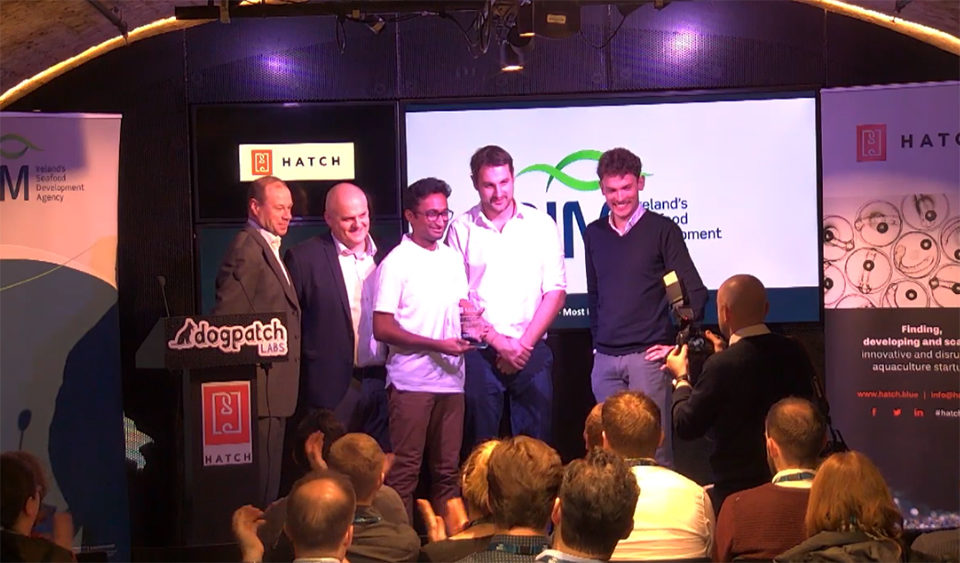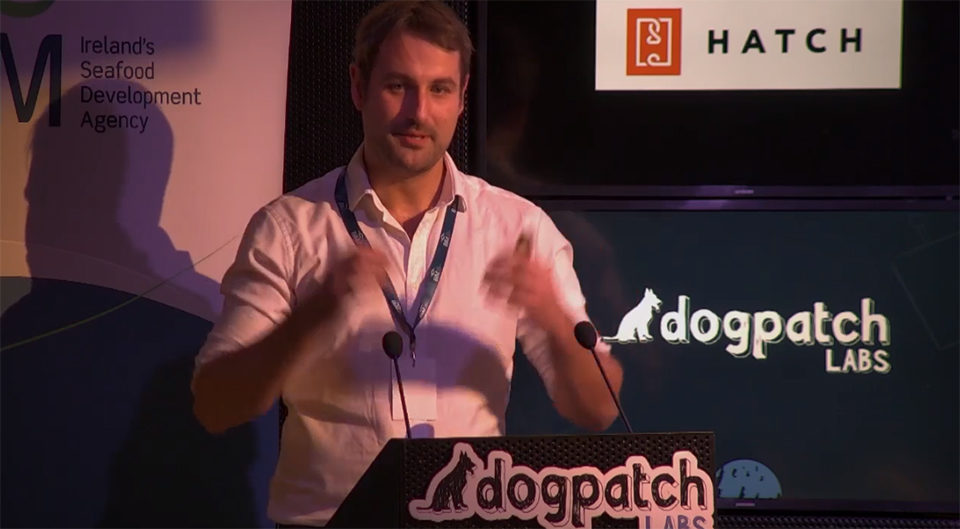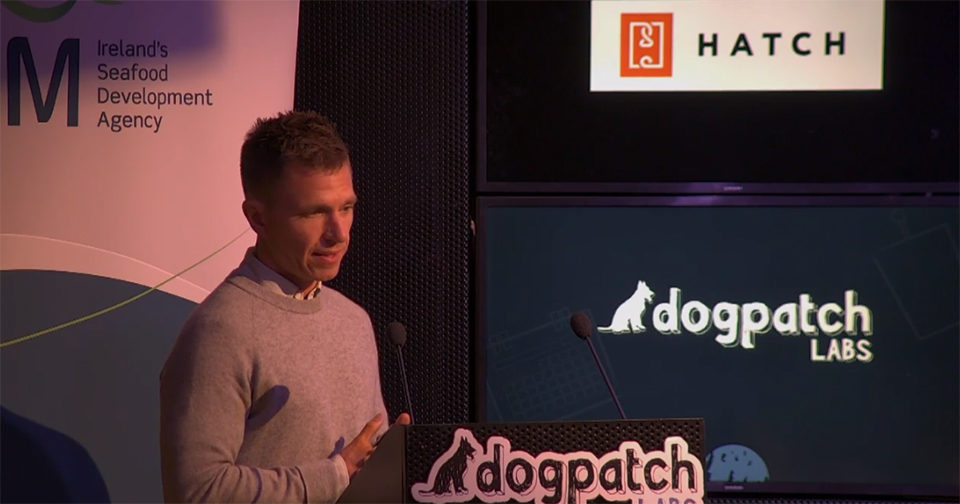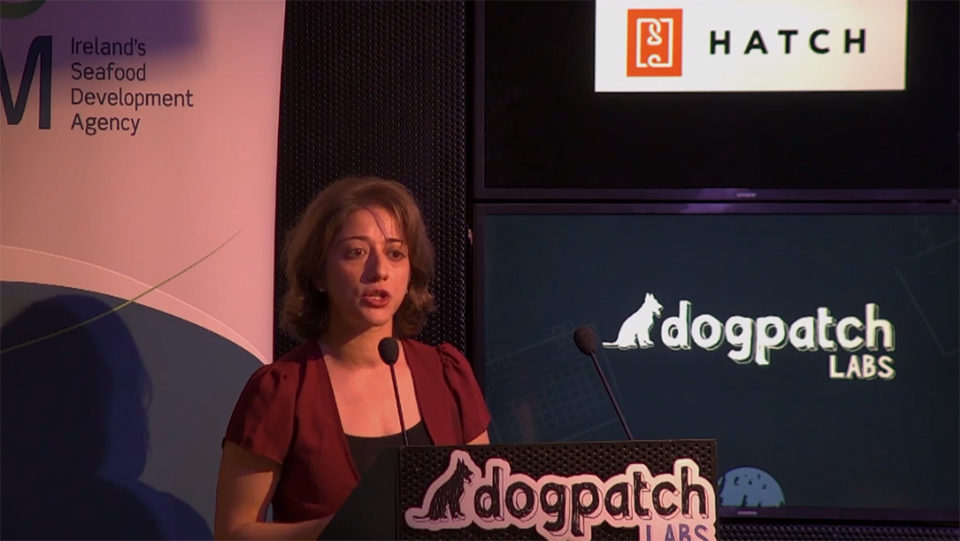Aquaculture accelerator’s second cohort delivers strong finish-line presentations at Dublin event

Most startups aim to solidify their proof of concept, close the next series of financing or line up industry partners for trials and eventual scale-up. Others, like Savitri Aquamonk, have loftier goals.
“At the epicenter of a $3.5 billion market, we are going to change how farming is done,” said Kranthi Chand, CEO of the company founded in 2015 in Andhra Pradesh, India’s most active shrimp-farming region, one of the most productive in the world.
Chand last week delivered his Demo Day pitch to an intimate live audience in Dublin, Ireland, as well as a robust online group, and came away a winner. The event, which marked the conclusion of the Hatch aquaculture business accelerator’s second cohort in 2018, was a showcase of exciting new aquaculture technology and fresh business energy. Chand’s business, one of six startups to present, was determined by an online poll (about 65 percent of the vote) as the “most investable.”
Chand appeared confident that the award was justified.
“We have revenues that will ensure our survival in next months and ensure growth,” said Chand, who is looking for new partners to try Savitri Aquamonk’s electronic devices that assist farmers in making decisions regarding water quality, weather parameters, finances, farm health, supply chain and crop production.
“We wanted to build a technology to shape the aquaculture industry,” said Chand, who predicted a “modern revolution coming” for India’s growing shrimp farming sector that will likely be relying on technology and connectivity.
There were far more winners on display at Demo Day, as all six businesses gained key industry contacts and access to more than three dozen mentors during the immersive three-month program that took participants to six countries. Hatch, which charges an entrance fee and takes a small stake in the companies it mentors, is building an “ecosystem of companies,” explained its co-founder and CEO Carsten Krome.
“For the six companies today, this is not the end of their engagement with Hatch. We’ll be working with our companies on an ongoing basis. It’s a business, run like a business,” he said. “Selecting these companies now, they’ll be main players in coming years. We have potential to make a lot of impact.”

Wittaya Aqua
Fish can die for lots of reasons, explained Evan Hall, CEO of Wittaya Aqua, a data analytics company based in Canada. But the biggest reason is because they’re fed too much.
“It happens in aquaculture, all year round in every species that’s farmed,” said Hall. “It’s an economic, environmental and social disaster. It can be prevented and at least better managed.”
Wittaya Aqua’s solution is to remove some of the human element in farm-management decision making, because every person might have a different idea of what satiation is. Core issues arise from varied human perceptions, and the company’s cloud-based data analytics solution allows farmers to improve their feed-conversion ratios and overall costs.
“Fifty to 80 percent of the cost of growing fish is in feed itself. If you want to tackle farm economics, that’s the place to go,” he said, adding that most farms overfeed, by overestimating their needs, by 30 percent or more.
Hall said the company is looking for $500,000 to build out its R&D team and find development partners: farms, feed companies or aquaculture production companies. Wittaya, hall explained, means “science” or “knowledge” in Thai. Wittaya-Aqua is focused on the India and Vietnam shrimp sectors.

Alune
James Fryer, CEO of UK-based Alune, is a serial entrepreneur who only recently became “absolutely fascinated with aquaculture,” particularly shrimp farming, where he noticed a huge market lacking in innovation, but with very high profit margins. Its negative environmental impact, he said, equaled opportunity – not to mention the massive production increases that many predict for the industry.
“The huge growth in aquaculture [production] to meet demand is not going to come from multinational companies,” Fryer said. “It’ll be smaller farms, in need of help, support and capital. And innovation – that’s what we provide.”
Alune seeks to act as an intermediary between farms and investors, Fryer explained, to enable opportunities, de-risk farming ventures and ensure high returns for investors.
“Our value to investors is 50 percent profit in four months,” Fryer said. “We travel, source and partner with very hard to access farms, making the near impossible possible.”
Fryer said Alune will offer farmers capital, technology and expertise, support and training and increased production and efficiency. Fryer was seeking €250,000 to build out its team (currently just two employees, Frery and COO Alex Farthing) and to bring more investment products online.
Ictiobiotic
Ictiobiotic, a Chilean biotech company for aquaculture health, is seeking to help the country’s salmon sector – the second largest in the world, following only Norway – battle mortality issues. Diseases are costing the industry huge losses and affecting its image, said Francisco Ascui, CEO.
“Is this a good sector to invest [in]? The answer is a big, fat yes! If you find the right solution,” said Ascui, who touted the company’s oral biotherapeutics, which act as improved probiotics that release functional proteins. The immunostimulants, he explained, offer protection from viruses and harmful bacteria.
Salmon piscirickettsia, or SRS, is costing the industry in Chile some $1 billion per year, said Ascui. “Solving this issue is mandatory,” he said.
Ascui said the company’s products should be available to the market in the second half of 2019, which is their current focus before branching into solutions for tilapia and shrimp. They are working with Chilean producers Blumar and Ventisqueros, which he said account for about 10 to 15 percent of the market.
“We need $750,000 to finish trials and build pipelines in Chile,” said Ascui.

Minnowtech
When shrimp are grown in turbid water, it’s hard for a farmer to know what their inventory is. Suzan Shaharestani, CEO of U.S.-based Minnowtech, had previously developed a technology that could detect translucent jellyfish in Chesapeake Bay.
After partnering with mathematician Kevin Kahover, the company developed a technology for shrimp farmers to get a better idea of the animals in their waters. Called the Shrimp Scanner, it’s a tool that can help producers track biomass, growth and behavior while optimizing feed and search for any abnormalities that might arise. Ultimately, the tool will help determine harvest date.
“If we put our technology in the water, it adds value by reducing feed costs by 10 percent. It predicts disease, and early harvest dates,” said Shaharestani, who was named by her fellow program participants as the “best contributor” among the cohort, given to the participant who most embodied the spirit of the accelerator process.
Minnowtech is seeking $600,000 in seed-level funding as well as strategic development partners for trials and product development, and a team of software engineers.
Prospective Research
Disease is the largest issue facing aquaculture, said Dakota Hamill, CEO of U.S.-based Prospective Research. And for it to double production in the next decade, with reduced use of antibiotics, it will need solutions not yet available.
But solutions is what Prospective Research is all about, and it speaks a unique language to develop them.
“We speak to bacteria,” said Hamill. “For any disease, there is bacteria that will help it and hurt it. We’ve run tens of thousands of assays. We can speak to microbes and treat the disease you need.”
The company, which Hamill explained was inspired by nature, is using microbes to develop patented solutions for key aquaculture diseases like EMS (Early Mortality Syndrome) in shrimp, which he said have cost the industry $45 billion in the last decade.
Hamill also noted that it has sent strains to a partner in Prince Edward Island, Canada, that have shown 100 percent ability to kill sea lice. Further trials are needed for that and for treatment for vibrio strains.
“Great ideas are born in the heart and mind,” said Hamill. “For us it was my parents’ basement.”
Over the next year, Prospective Research is hoping to continue in vivo feed trials for EMS and sea lice. Hamill made no specific financial requirements, but is open to joint ventures.
“As a startup, we want to remain nimble,” he said.
‘Aquaculture is sexy’
Demo Day was attended by aquaculture industry leaders in Ireland, and was sponsored by BIM (Bord Iascaigh Mhara) and Cargill. Else Berit Eikeland, Norwegian Ambassador to Ireland, gave opening remarks and noted that there was a large online audience in Bergen, Norway, where Hatch held its first cohort this spring and where it operates an office.
“There is a global demand for sustainable seafood. It’s important to share knowledge and competence and focus on science and innovation. That’s why this group is so important, on a macro level, to make the world more sustainable with better seafood production,” said Eikeland.
Isaac Fraynd, dealflow manager for Netherlands-based investment firm Aqua-Spark, said the energy that new startups entering the space are bringing is “inspiring.”
“Aquaculture is sexy. As I watched the elevator pitches for this cohort, I asked them what is so impressive about aquaculture to attract such a talent pool. It comes down to how incredible our story is,” said Fraynd. “I’m excited to see what they have in store.”
Hatch’s next cohort, which Krome said would include 10 to 16 new companies, will commence in September 2019 in Bergen, Norway.
Follow the Advocate on Twitter @GAA_Advocate
Author
-

James Wright
Editorial Manager
Global Aquaculture Alliance
Portsmouth, NH, USA
Tagged With
Related Posts

Innovation & Investment
Entrepreneurs need toughness, commitment to thrive in Hatch
For entrepreneurs in the Hatch accelerator program, the process of attracting investors to herald a new growth curve is an intense and immersive one.

Innovation & Investment
Aquaculture Exchange: Carsten Krome, Alimentos Ventures
A business accelerator helps small businesses grow and ready themselves to capitalize on institutional investment opportunities. Sounds exactly what the aquaculture industry needs. Carsten Krome tells the Advocate about the various business models his new firm is investigating.

Innovation & Investment
Bergen becoming seafood startup city as accelerator Hatch sets up shop
Hatch Aquaculture Accelerator aims to support new companies, via an immersive three-month mentorship program, in the health, nutrition, technology and production sectors.

Innovation & Investment
JALA engineering innovation for Indonesian shrimp farmers
A company in Indonesia hopes the vast network of shrimp farms throughout the country will adopt its IoT device, particularly when they’re on the go.

